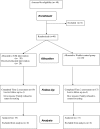Theory of Mind training in children with autism: a randomized controlled trial
- PMID: 20976617
- PMCID: PMC3134713
- DOI: 10.1007/s10803-010-1121-9
Theory of Mind training in children with autism: a randomized controlled trial
Abstract
Many children with Autism Spectrum Disorders (ASD) participate in social skills or Theory of Mind (ToM) treatments. However, few studies have shown evidence for their effectiveness. The current study used a randomized controlled design to test the effectiveness of a 16-week ToM treatment in 8-13 year old children with ASD and normal IQs (n = 40). The results showed that, compared to controls, the treated children with ASD improved in their conceptual ToM skills, but their elementary understanding, self reported empathic skills or parent reported social behaviour did not improve. Despite the effects on conceptual understanding, the current study does not indicate strong evidence for the effectiveness of a ToM treatment on the daily life mindreading skills.
Figures
References
-
- American Psychological Association . Publication Manual of the American Psychological Association. Washington DC: Author; 2001.
-
- Baron-Cohen S, Tager-Flusberg H, Cohen DJ. Understanding other minds: Perspectives from developmental cognitive neuroscience. Oxford: Oxford University Press; 2000.
-
- Baron-Cohen S, Wheelwright S, Hill J, Raste Y, Plumb I. The “Reading the Mind in the Eyes” Test revised version: A study with normal adults, and adults with Asperger syndrome or high-functioning autism. Journal of Child Psychology and Psychiatry. 2001;42:241–251. doi: 10.1111/1469-7610.00715. - DOI - PubMed
-
- Begeer S, Malle BF, Nieuwland MS, Keysar B. Using Theory of Mind to represent and take part in social interactions: Comparing individuals with high-functioning autism and typically developing controls. European Journal of Developmental Psychology. 2010;7:104–122. doi: 10.1080/17405620903024263. - DOI
Publication types
MeSH terms
LinkOut - more resources
Full Text Sources
Other Literature Sources


